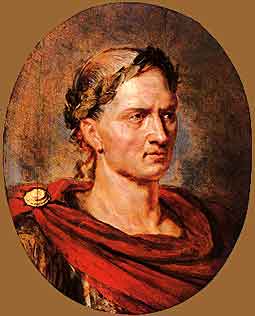When I was little, my mom always told me I was born on the "IDES OF MARCH!!!" At the time I didn't know what the Ides of March were, but i knew they were special. I thought it maybe had something to do with St. Patrick's Day, maybe something green at least. Nope! Literally the Ides of march (Idus Martiae in Latin) just mean the 15th of March. The ides are just the approximate halfway point in any given month. But the Ides of March are so much more! First this day was a day of festivities celebrating the god Mars. And then March 15th in the year 44 B.C.E. Gaius Julius Caesar was assassinated!
↓ Assassination ↓

Gaius Julius Ceasar[GAIVS IVLIVS CAESAR in Latin] (12 July 100 B.C.E.- 15 March 44 B.C.E.) grew up during a time of civil unrest and war in Rome. Cheap slaves from the large Roman empire created unemployment. There were two leaders in power; Sulla the Roman dictator, and Marius. As part of being in the Julius family Gaius was expected to take a low government position. But when his father died in 85 B.C.E. he decided he wanted to be more.
Gaius, married Cornelia, a member of an even more important family than his own. He started making connections to powerful politicians, many of which were followers of Marius. Because Sulla was dictator, he was having all followers of Marius killed or jailed. In 81 B.C.E. at age 19 Gaius was arrested, but through his powerful contacts, he was released. After being released, it was decided it would be safer for Gaius outside Rome.
Gaius Julius went to Cilicia, where he proved himself as a capable soldier. Gaius spent some years in the army, where it is believed he was part of bringing down the slave rebellion of Spartacus. After he left the army he studied persuasive speaking in Southern Italy. On a ship to Rhodes Caesar was captured by pirates, whom he befriended and joked with. After being released by ransom payment, Caesar hunted down the pirates and had them all crucified.
After being appointed aedile Caesar organized many gladiator battles, banquets and public works, all of which bought him favour in the senate. Caesar was bribing his way into higher political standing. While all of this was costing Caesar money, he didn't care; he had successfully bribed his way into being appointed pontifex maximus. Because the office of pontifex maximus was a religious one it was very hard for anyone to criticize him.

In 60 BC Caesar was sent to Spain as praetor. There he did well as a military commander, where many thought he would fail in an area of tribal unrest. During his very successful military campaigns in Spain Gaius was able to pay back his financial debt with the spoils of war.
In 59 BC Caesar formed a triumvirate with Crassus and Pompey. With their help Caesar was elected Consul of Rome. The highest office attainable. During his consulship, Caesar enacted many favorable laws. He cancelled all taxes on farmers and gave land to any man with over three children. It was laws like these that showed how easy it was for him to see and correct the main Roman problems causing unrest.
As his one-year term of Consul came to an end Caesar appointed himself governor of Gaul, as governor, Caesar raised troop numbers, and started a new military campaign. He defeated the Helvetians, the Germans, and the Nervii.
When The Germans rose up against Caesar again he proceeded across the Rhine against the wishes of the senate. He crushed the German army, and went further to attack the Britain's, a power virtually unknown to Rome.
When the senate took away his governorship, he took his army and marched on Rome itself. He was met with almost no resistance. He appointed himself dictator, and proceeded to defeat Pompey's army. After returning from Egypt where he had chased Pompey to his death, Julius had to defeat Pompey' sons. He did and he convinced a senate with almost no power themselves to appoint him Dictator for life.
Gaius planned to attack Parthia, but he never got to going because he was assassinated by a group of aristocrats led by Marcus, Junius, Brutus, and Gaius Cassius. They were afraid that Gaius Julius Caesar would try to appoint himself king. Caesar was stabbed 23 times on March 15th 44 B.C.E.
Gaius Julius Caesar was a great military leader, who ended a time of corrupt government in Rome, and helped the lower class citizens. Though he might have done these things selfishly, trying to provide glory for himself, he still did them. He made Rome a better place to live, and following his assassination, civil war broke out once more. Gaius Julius Caesar was great because he did things no one else would do, and he did them with a level of intelligence, and knowledge I believe no one else at the time came close to.
See Also:
Hyper History Essay:
http://www.hyperhistory.net/apwh/bios/b2caesarjulius.htm
Wikipedia: Roman Republic:
http://en.wikipedia.org/wiki/Roman_Republic
The Roman Empire:
http://www.roman-empire.net/republic/caesar-index.html
Western Civilization, Volume I: To 1715, 8th Edition:
http://www.cengagebrain.com/shop/ISBN/0495913294?cid=GSEM1&gclid=CMP75e37qqsCFSkBQAodr1Jo7A

